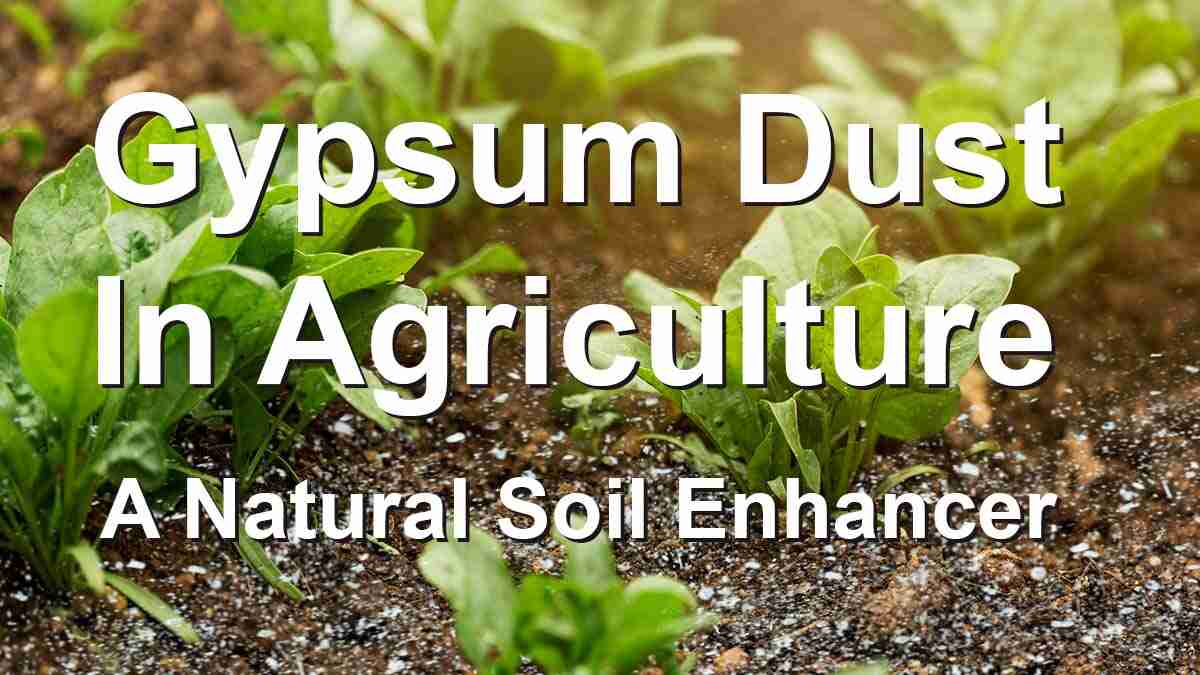Gypsum dust also known as agricultural gypsum or calcium sulfate dihydrate (CaSO4·2H2O) is a natural soil amendment that has been used in gardening and agriculture for centuries. It is valued for its unique mineral composition and its numerous benefits for soil and plant health. Here is a detailed overview of gypsum dust including its mineral compositions, properties, typical analysis and its advantages for gardening:
Types Of Gypsum Dust
There are two main types of Gypsum Dust: Agricultural gypsum and Industrial gypsum. Agricultural gypsum is specifically processed for use in farming. Industrial gypsum may contain impurities that make it unsuitable for agricultural purposes. It’s essential to choose the right type for optimal results.
Mineral Compositions
Gypsum dust consists primarily of calcium sulfate dihydrate, which is composed of the following elements:
- Calcium (Ca): Gypsum is an excellent source of calcium a vital nutrient for plant growth. Calcium is essential for cell wall formation, root development and various metabolic processes in plants.
- Sulfur (S): Gypsum provides sulfur another essential nutrient for plants. Sulfur is involved in the synthesis of amino acids and proteins. It contributes to overall plant health.
Properties
Gypsum dust is typically finely ground into a powder, which is white or off-white in color. It has a soft powdery texture and is easily incorporated into soil.
Typical Analysis
The mineral composition of gypsum dust is relatively straightforward, with the primary component being calcium sulfate dihydrate (CaSO4·2H2O). A typical analysis would include:

Benefits Of Gypsum Dust For Gardening
Gypsum dust offers several advantages for gardening and agriculture:
- Soil Structure Improvement: Gypsum helps improve soil structure by reducing soil compaction. It does this by flocculating (clumping together) soil particles creating larger more stable aggregates. This allows for better aeration and water infiltration promoting healthier root growth and overall plant vigor.
- Alleviating Soil Salinity: Gypsum can help mitigate soil salinity issues by replacing sodium ions in the soil with calcium ions. This process called “sodic soil reclamation,” improves soil structure and allows for better water penetration.
- pH Adjustment: While not as effective as other soil amendments like limestone in adjusting pH, gypsum can have a slight neutralizing effect on mildly alkaline soils.
- Calcium and Sulfur Supply: Gypsum is an excellent source of calcium and sulfur both of which are essential nutrients for plant growth. It provides a slow-release source of these nutrients over time.
- Disease Prevention: Gypsum can help prevent soil-borne diseases by improving soil structure and reducing soil compaction, which can create conditions conducive to disease development.
- Environmental Benefits: The use of gypsum dust is considered environmentally friendly as it is a natural mineral that can help improve soil quality. It even reduces the need for synthetic soil conditioners.
- Water Management: Water scarcity is a growing concern in agriculture. Gypsum dust aids in water management by improving soil’s water-holding capacity. It reduces the risk of water wastage and ensures that crops receive adequate moisture.
In summary, gypsum dust is a valuable soil amendment primarily used to improve soil structure, alleviate soil salinity and provide plants with calcium and sulfur. It enhances soil aeration and water infiltration promotes healthier root development and can prevent disease. Gardeners and farmers often use gypsum dust as part of their soil management strategies to support healthier and more productive crops.
Gypsum Dust: Dos And Don’ts
While gypsum dust can be highly beneficial, its usage should be guided by certain principles. It’s crucial to follow recommended application rates and not overuse it, as excessive gypsum can have adverse effects.
Conclusion
Gypsum dust is a versatile tool in modern agriculture contributing to improved soil structure, nutrient availability and water management. Its eco-friendly nature and cost-effectiveness make it a valuable resource for farmers striving for sustainable and productive farming practices. By integrating gypsum dust into their agricultural processes, farmers can expect healthier crops and increased yields.
Also Read
Rock Dust in Your Garden: The Key to Lush and Healthy Plants
Industrial Dust: Understanding its Impact and Management
FAQs
Is Gypsum Dust safe for the environment?
Yes, Gypsum Dust is safe for the environment as it is a natural mineral with no harmful chemical additives. It also aids in reducing soil erosion and nutrient runoff.
How do I determine the right amount of Gypsum Dust to use on my soil?
It is advisable to conduct a soil test and consult with agricultural experts to determine the appropriate application rate for your specific soil and crop needs.
Can Gypsum Dust be used for all types of crops?
Gypsum Dust can be tailored to meet the specific requirements of different crops. It is a versatile soil conditioner suitable for a wide range of agricultural applications.
What is the shelf life of Gypsum Dust?
Gypsum Dust has an indefinite shelf life when stored in a dry and cool environment.
Are there any alternatives to Gypsum Dust for soil improvement?
While there are other soil amendments available Gypsum Dust stands out due to its cost-effectiveness, natural origin and multiple benefits. It is a preferred choice for many farmers.


Leave a Reply